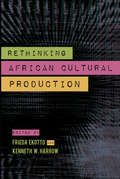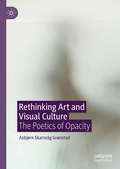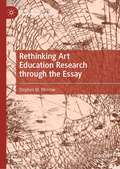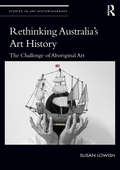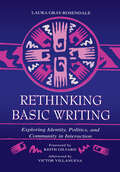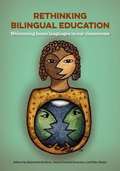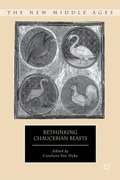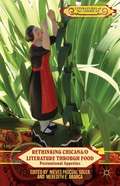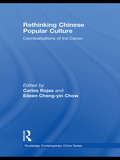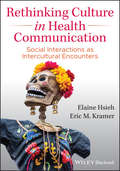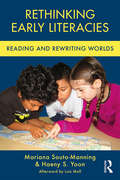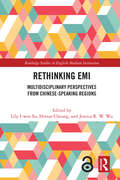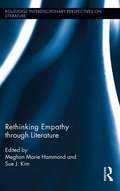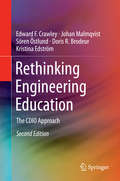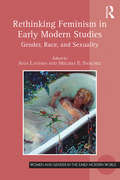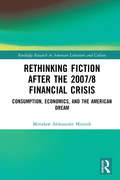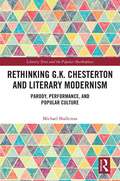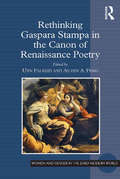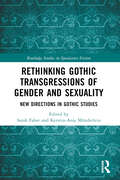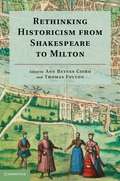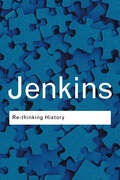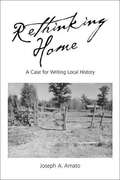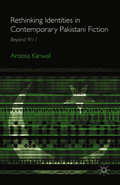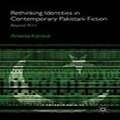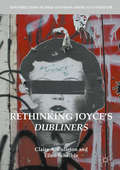- Table View
- List View
Rethinking African Cultural Production
by Frieda Ekotto Kenneth W. HarrowFrieda Ekotto, Kenneth W. Harrow, and an international group of scholars set forth new understandings of the conditions of contemporary African cultural production in this forward-looking volume. Arguing that it is impossible to understand African cultural productions without knowledge of the structures of production, distribution, and reception that surround them, the essays grapple with the shifting notion of what "African" means when many African authors and filmmakers no longer live or work in Africa. While the arts continue to flourish in Africa, addressing questions about marginalization, what is center and what periphery, what traditional or conservative, and what progressive or modern requires an expansive view of creative production.
Rethinking Art and Visual Culture: The Poetics of Opacity
by Asbjørn Skarsvåg GrønstadThis is the first book to offer a systematic account of the concept of opacity in the aesthetic field. Engaging with works by Ernie Gehr, John Akomfrah, Matt Saunders, David Lynch, Trevor Paglen, Zach Blas, and Low, the study considers the cultural, epistemological, and ethical values of images and sounds that are fuzzy, indeterminate, distorted, degraded, or otherwise indistinct. Rethinking Art and Visual Culture shows how opaque forms of art address problems of mediation, knowledge, and information. It also intervenes in current debates about new systems of visibility and surveillance by explaining how indefinite art provides a critique of the positivist drive behind these regimes. A timely contribution to media theory, cinema studies, American studies, and aesthetics, the book presents a novel and extensive analysis of the politics of transparency.
Rethinking Art Education Research through the Essay (Palgrave Studies in Educational Futures)
by Stephen M. MorrowThis book explores the pedagogical applications of critical thinking in art education and scholarship. In the first part of the book, the author delves into the ways that arts-based educational research has incorporated critical thinking in order to illuminate the context for the subsequent study. The second half of the book focuses on the essay as a genre used in creative nonfiction and film in order to enact the concept of critical thinking in art education. In this way, the book sheds light on a new landscape of thinking arts education and thinking scholarship through the essay that is practiced in creative nonfiction and cinema.
Rethinking Australia’s Art History: The Challenge of Aboriginal Art (Studies in Art Historiography)
by Susan LowishThis book aims to redefine Australia’s earliest art history by chronicling for the first time the birth of the category "Aboriginal art," tracing the term’s use through published literature in the late eighteenth, nineteenth and early twentieth centuries. Susan Lowish reveals how the idea of "Aboriginal art" developed in the European imagination, manifested in early literature, and became a distinct classification with its own criteria and form. Part of the larger story of Aboriginal/European engagement, this book provides a new vision for an Australian art history reconciled with its colonial origins and in recognition of what came before the contemporary phenomena of Aboriginal art.
Rethinking Basic Writing: Exploring Identity, Politics, and Community in interaction
by Laura Gray-RosendaleThis book surveys the history of basic writing scholarship, suggesting that we cannot adequately theorize the situations of basic writers unless we examine how they construct their own conceptions of their identities, their constructions of their relationships to social forces, and their representations of their relationships to written work. Using a cross-disciplinary analytic model, Gray-Rosendale offers a detailed examination of the oral conversations that take place within one basic writing peer revision group. She explains the ways in which the students' own conversational structures impact and shape their written products. Gray-Rosendale then draws out the potentials of her work for basic writing administrators, curricula builders, and teachers.
Rethinking Bilingual Education: Welcoming Home Languages In Our Classrooms
by Elizabeth Barbian"The articles in Rethinking Bilingual Education show the many ways that teachers bring students’ home languages into their classroom—from powerful examples of social justice curriculum taught by bilingual teachers to ideas and strategies for how to honor students’ languages in schools with no bilingual program. We see bilingual educators work to keep equity at the center and to build solidarity among diverse communities. Teachers and students speak to the tragedy of language loss but also about the inspiring work to revitalize languages on the brink of disappearance and to defend and expand bilingual education programs"--Publisher's website.
Rethinking Chaucerian Beasts
by Carolynn Van DykeBuilding on recent work in critical animal studies and posthumanism, this book challenges past assumptions that animals were only explored as illustrative of humanity, not as interesting in their own right. The contributors combine close reading of Chaucer's texts with insights drawn from cultural or critical animal studies.
Rethinking Chicana/o Literature Through Food
by Nieves Pascual Soler Meredith E. AbarcaAs Food Studies has grown into a well-established field, literary scholars have not fully addressed the prevalent themes of food, eating, and consumption in Chicana/o literature. Here, contributors propose food consciousness as a paradigm to examine the literary discourses of Chicana/o authors as they shift from the nation to the postnation.
Rethinking Chinese Popular Culture: Cannibalizations of the Canon (Routledge Contemporary China Series)
by Carlos Rojas Eileen Cheng-yin ChowThrough analyses of a wide range of Chinese literary and visual texts from the beginning of the twentieth century through the contemporary period, the thirteen essays in this volume challenge the view that canonical and popular culture are self-evident and diametrically opposed categories, and instead argue that the two cultural sensibilities are inextricably bound up with one another. An international line up of contributors present detailed analyses of literary works and other cultural products that have previously been neglected by scholars, while also examining more familiar authors and works from provocative new angles.The essays include investigations into the cultural industries and contexts that produce the canonical and popular, the position of contemporary popular works at the interstices of nostalgia and amnesia, and also the ways in which cultural texts are inflected with gendered and erotic sensibilities while at the same time also functioning as objects of desire in its own right. As the only volume of its kind to cover the entire span of the 20th century, and also to consider the interplay of popular and canonical literature in modern China with comparable rigor, Rethinking Chinese Popular Culture is an important resource for students and scholars of Chinese literature and culture.
Rethinking Culture in Health Communication: Social Interactions as Intercultural Encounters
by Elaine Hsieh Eric M. KramerAn interdisciplinary overview of health communication using a cultural lens—uniquely focused on social interactions in health contexts In increasingly diverse communities around the world, patients, health professionals, and policymakers embody cultural constructs that impact healthcare processes. Rethinking Culture in Health Communication explores the ways culture influences healthcare, introducing new approaches to understanding social relationships and health policies as a dynamic process involving cultural values, expectations, motivations, and behavioral patterns. This innovative textbook integrates theories and practices in health communication, public health, and medicine to help students relate fundamental concepts to their personal experiences and develop an awareness of how all individuals and groups are shaped by culture. The authors present a foundational framework explaining how cultures can be understood from three perspectives—Magic Consciousness, Mythic Connection, and Perspectival Thinking—to examine existing theories, social norms, and clinical practices in health-related contexts.Detailed yet accessible chapters discuss culture and health behaviors, interpersonal communication, minority health and healthcare delivery, cultural consciousness, social interactions, sociopolitical structure, and more. The text features examples of how culture can create challenges in access, process, and outcomes of healthcare services. It includes scenarios in which individuals and institutions hold different or incompatible ethical views. The text also illustrates how theoretical concepts can emerge in caregiver-patient communication, provider-patient interactions, social policies, public health interventions, and other real-life settings. Written by two leading health communication scholars, this textbook: Highlights the sociocultural, interprofessional, clinical, and ethical aspects of health communication Explores the intersections of social relationships, cultural tendencies, and health Covers the various forms, functions, and meanings of health, illness, and healthcare in a range of cultural contexts Discusses how cultural elements in social interactions are essential to successful health interventions Includes foundational overviews of health communication and of culture in health-related fields Discusses culture in health administration, moral values in social policies, and ethics in medical development Incorporates various aspects and impacts of the COVID-19 pandemic as a cultural phenomenon through the lens of health communication Rethinking Culture in Health Communication is an ideal textbook for courses in health communication, particularly those focused on interpersonal communication, as well as in cross-cultural communication, cultural phenomenology, sociology, social work, public health, and other health-related fields.
Rethinking Early Literacies: Reading and Rewriting Worlds (Changing Images of Early Childhood)
by Mariana Souto-Manning Haeny S. YoonRethinking Early Literacies honors the identities of young children as they read, write, speak, and play across various spaces, in and out of pre/school. Despite narrow curricular mandates and policies, the book highlights the language resources and tools that children cultivate from families, communities, and peers. The chapters feature children’s linguistic flexibility with multiple languages, creative appropriation of popular culture, participation in community literacy practices, and social negotiation in the context of play. Throughout the book, the authors critically reframe what it means to be literate in contemporary society, specifically discussing the role of educators in theorizing and rethinking language ideologies for practice. Issues influencing early childhood education in trans/national contexts are forefronted (e.g. racism, immigration rights, readiness) throughout the book, with a call to support and sustain communities of color.
Rethinking EMI: Multidisciplinary Perspectives from Chinese-Speaking Regions (Routledge Studies in English-Medium Instruction)
by Su, Lily I-wenDue to the competitive edge it confers on students, educational institutions, and non-English speaking nations in a globalized economy, English as a medium of instruction (EMI) has been gaining popularity in tertiary education in non-native English-speaking (NNES) countries. Institute-wide EMI implementation has often been imposed by top-down decisions, in combination with the optimistic view that the horse should always be placed before the cart. However, emerging evidence suggests that the delivery of such programs to NNES students has led to new pedagogical challenges and learning problems that go beyond the scope of language learning and teaching and deserve immediate attention. For example, how would an instructor respond to situations in which students’ learning of content is compromised by their limited language proficiency? This book draws on the current practice of EMI in diverse disciplines and university settings and examines how these new pedagogical and learning issues can be addressed. The discussion also involves a reflection on the essence of EMI in relation to the use of the first language (L1) as the medium of instruction in tertiary education. In addition, the book includes discussion about how to ensure and maintain the quality of EMI programs and assess the readiness of stakeholders for such programs, which include administrators, teachers, and students. The discussion is led by exemplars in Hong Kong and Taiwan, where the majority of students are native Chinese speakers, in the hope of developing critical perspectives and practical guidelines as references for EMI in other NNES settings.
Rethinking Empathy through Literature (Routledge Interdisciplinary Perspectives on Literature)
by Sue J. Kim Meghan Marie HammondIn recent years, a growing field of empathy studies has started to emerge from several academic disciplines, including neuroscience, social psychology, and philosophy. Because literature plays a central role in discussions of empathy across disciplines, reconsidering how literature relates to "feeling with" others is key to rethinking empathy conceptually. This collection challenges common understandings of empathy, asking readers to question what it is, how it works, and who is capable of performing it. The authors reveal the exciting research on empathy that is currently emerging from literary studies while also making productive connections to other areas of study such as psychology and neurobiology. While literature has been central to discussions of empathy in divergent disciplines, the ways in which literature is often thought to relate to empathy can be simplistic and/or problematic. The basic yet popular postulation that reading literature necessarily produces empathy and pro-social moral behavior greatly underestimates the complexity of reading, literature, empathy, morality, and society. Even if empathy were a simple neurological process, we would still have to differentiate the many possible kinds of empathy in relation to different forms of art. All the complexities of literary and cultural studies have still to be brought to bear to truly understand the dynamics of literature and empathy.
Rethinking Engineering Education
by Edward F. Crawley Johan Malmqvist Sören Östlund Doris R. Brodeur Kristina EdströmThis book describes an approach to engineering education that integrates a comprehensive set of personal, interpersonal, and professional engineering skills with engineering disciplinary knowledge in order to prepare innovative and entrepreneurial engineers. The education of engineers is set in the context of engineering practice, that is, Conceiving, Designing, Implementing, and Operating (CDIO) through the entire lifecycle of engineering processes, products, and systems. The book is both a description of the development and implementation of the CDIO model and a guide to engineering programs worldwide that seek to improve the education of young engineers.
Rethinking Feminism in Early Modern Studies: Gender, Race, and Sexuality (Women and Gender in the Early Modern World)
by Ania Loomba Melissa E SanchezWinner of the Society for the Study of Early Modern Women’s Collaborative Book Prize 2017 Rethinking Feminism in Early Modern Studies is a volume of essays by leading scholars in the field of early modern studies on the history, present state, and future possibilities of feminist criticism and theory. It responds to current anxieties that feminist criticism is in a state of decline by attending to debates and differences that have emerged in light of ongoing scholarly discussions of race, affect, sexuality, and transnationalism-work that compels us continually to reassess our definitions of ’women’ and gender. Rethinking Feminism demonstrates how studies of early modern literature, history, and culture can contribute to a reimagination of feminist aims, methods, and objects of study at this historical juncture. While the scholars contributing to Rethinking Feminism have very different interests and methods, they are united in their conviction that early modern studies must be in dialogue with, and indeed contribute to, larger theoretical and political debates about gender, race, and sexuality, and to the relationship between these areas. To this end, the essays not only analyze literary texts and cultural practices to shed light on early modern ideology and politics, but also address metacritical questions of methodology and theory. Taken together, they show how a consciousness of the complexity of the past allows us to rethink the genealogies and historical stakes of current scholarly norms and debates.
Rethinking Fiction after the 2007/8 Financial Crisis: Consumption, Economics, and the American Dream (Routledge Research in American Literature and Culture)
by Mirosław Aleksander MiernikThis book provides insight into the impact the 2007/8 financial crisis and subsequent Great Recession had on American fiction. Employing an interdisciplinary approach which combines literary studies with anthropology, economics, sociology, and psychology, the author attempts to gauge the changes that the crisis facilitated in the American novel. Focusing on four books, Elizabeth Strout’s My Name Is Lucy Barton, Philipp Meyer’s American Rust, Sophie McManus’s The Unfortunates, and William Gibson’s The Peripheral, the study traces how they present such issues as poverty, wealth, equality, distinction, opportunity, and how they relate both to traditional criticisms of consumer culture and the US economy, particularly those issues that have received more attention as a result of the crisis. It also tackles the issue of genre and interpretation in this period, as well as what methods the analyzed novels employ in order to highlight the decreasing social mobility of Americans.
Rethinking G.K. Chesterton and Literary Modernism: Parody, Performance, and Popular Culture (Literary Texts and the Popular Marketplace)
by Michael ShallcrossThis book comprehensively rethinks the relationship between G.K. Chesterton and a range of key literary modernists. When Chesterton and modernism have previously been considered in relation to one another, the dynamic has typically been conceived as one of mutual hostility, grounded in Chesterton’s advocacy of popular culture and modernist literature’s appeal to an aesthetic elite. In setting out to challenge this binary narrative, Shallcross establishes for the first time the depth and ambivalence of Chesterton’s engagement with modernism, as well as the reciprocal fascination of leading modernist writers with Chesterton’s fiction and thought. Shallcross argues that this dynamic was defined by various forms of parody and performance, and that these histrionic expressions of cultural play not only suffused the era, but found particular embodiment in Chesterton’s public persona. This reading not only enables a far-reaching reassessment of Chesterton’s corpus, but also produces a framework through which to re-evaluate the creative and critical projects of a host of modernist writers—most sustainedly, T.S. Eliot, Wyndham Lewis, and Ezra Pound—through the prism of Chesterton's disruptive presence. The result is an innovative study of the literary performance of popular and ‘high’ culture in early twentieth-century Britain, which adds a valuable new perspective to continuing critical debates on the parameters of modernism.
Rethinking Gaspara Stampa in the Canon of Renaissance Poetry (Women and Gender in the Early Modern World)
by Unn Falkeid Aileen FengDespite the fact that Gaspara Stampa (1523?-1554) has been recognized as one of the greatest and most creative poets and musicians of the Italian Renaissance, scholarship on her work has been surprisingly scarce and uncoordinated. In recent years, critical attention towards her work has increased, but until now there have been no anthologies dedicated solely to Stampa. Rethinking Gaspara Stampa in the Canon of Renaissance Poetry aims to set a foundation for further Stampa studies by accounting for her contributions to literature, music history, gender studies, the history of ideas, philosophy, and other areas of critical thought. This volume brings together an international group of interdisciplinary scholars who employ varied methodologies to explore multiple aspects of Stampa’s work in dialogue with the most recent scholarship in the field. The chapters emphasize the many ways in which Stampa’s poetry engages with multiple cultural movements of early modern Italy and Europe, including: Ficinian and Renaissance Neoplatonism, male-authored writing about women, Longinus’s theory of the sublime, the formation of writing communities, the rediscovery of Aristotle’s writings, and the reimagined relation between human and natural worlds. Taken as a whole, this volume presents a rich introduction to, and interdisciplinary investigation of, Gaspara Stampa’s impact on Renaissance culture.
Rethinking Gothic Transgressions of Gender and Sexuality: New Directions in Gothic Studies (Routledge Studies in Speculative Fiction)
by Sarah Faber Kerstin-Anja MünderleinFrom early examples of queer representation in mainstream media to present-day dissolutions of the human-nature boundary, the Gothic is always concerned with delineating and transgressing the norms that regulate society and speak to our collective fears and anxieties.This volume examines British and American Gothic texts from four centuries and diverse media – including novels, films, podcasts, and games – in case studies which outline the central relationship between the Gothic and transgression, particularly gender(ed) and sexual transgression. This relationship is both crucial and constantly shifting, ever in the process of renegotiation, as transgression defines the Gothic and society redefines transgression. The case studies draw on a combination of well-studied and under-studied texts in order to arrive at a more comprehensive picture of transgression in the Gothic.Pointing the way forward in Gothic Studies, this original and nuanced combination of gendered, Ecogothic, queer, and media critical approaches addresses established and new scholars of the Gothic alike.
Rethinking Historicism from Shakespeare to Milton
by Thomas Fulton Ann Baynes CoiroReading literary texts in their historical contexts has been the dominant form of interpretation in literary criticism for the past thirty years. This collection of essays reflects on the origins of historicism and its present usefulness as a mode of literary analysis, its limitations and its future. The volume provides a brief history of the practice from its Renaissance origins, offering examples of historicist work that not only demonstrate the continuing vitality of this methodology but also suggest new directions for research. Focusing on the major figures of Shakespeare and Milton, these essays provide important and concise representations of trends in the field. Designed for scholars and students of early modern English literature (1500-1700), the volume will also be of interest to students of literature more generally and to historians.
Rethinking History (Routledge Classics)
by Keith JenkinsHistory means many things to many people. But finding an answer to the question 'What is history?' is a task few feel equipped to answer. If you want to explore this tantalising subject, where do you start? What are the critical skills you need to begin to make sense of the past? The perfect introduction to this thought-provoking area, Jenkins' clear and concise prose guides readers through the controversies and debates that surround historical thinking at the present time, providing them with the means to make their own discoveries.
Rethinking Home: A Case for Writing Local History
by Joseph A. Amato Richard O. DaviesA passionate and provocative call to revive the neglected practice of local history, full of ideas and insights for how to embrace and celebrate the stories from one's home region, which form the "sinews of community." Amato shows us that history begins in our own neighborhoods and urges us to pay attention.
Rethinking Identities in Contemporary Pakistani Fiction: Beyond 9/11
by A. KanwalThis book focuses on the way that notions of home and identity have changed for Muslims as a result of international 'war on terror' rhetoric. It uniquely links the post-9/11 stereotyping of Muslims and Islam in the West to the roots of current jihadism and the resurgence of ethnocentrism within the subcontinent and beyond.
Rethinking Identities in Contemporary Pakistani Fiction
by Aroosa KanwalThis book focuses on the way that notions of home and identity have changed for Muslims as a result of international 'war on terror' rhetoric. It uniquely links the post-9/11 stereotyping of Muslims and Islam in the West to the roots of current jihadism and the resurgence of ethnocentrism within the subcontinent and beyond.
Rethinking Joyce's Dubliners
by Claire A. Culleton Ellen ScheibleThis collection of essays is a critical reexamination of Joyce's famed book of short stories, Dubliners. Despite the multifaceted critical attention Dubliners has received since its publication more than a century ago, many readers and teachers of the stories still rely on and embrace old, outdated readings that invoke metaphors of paralysis and stagnation to understand the book. Challenging these canonical notions about mobility, paralysis, identity, and gender in Joyce's work, the ten essays here suggest that Dubliners is full of incredible movement. By embracing this paradigm shift, current and future scholars can open themselves up to the possibility of seeing that movement, maybe even noticing it for the first time, can yield surprisingly fresh twenty-first-century readings.
